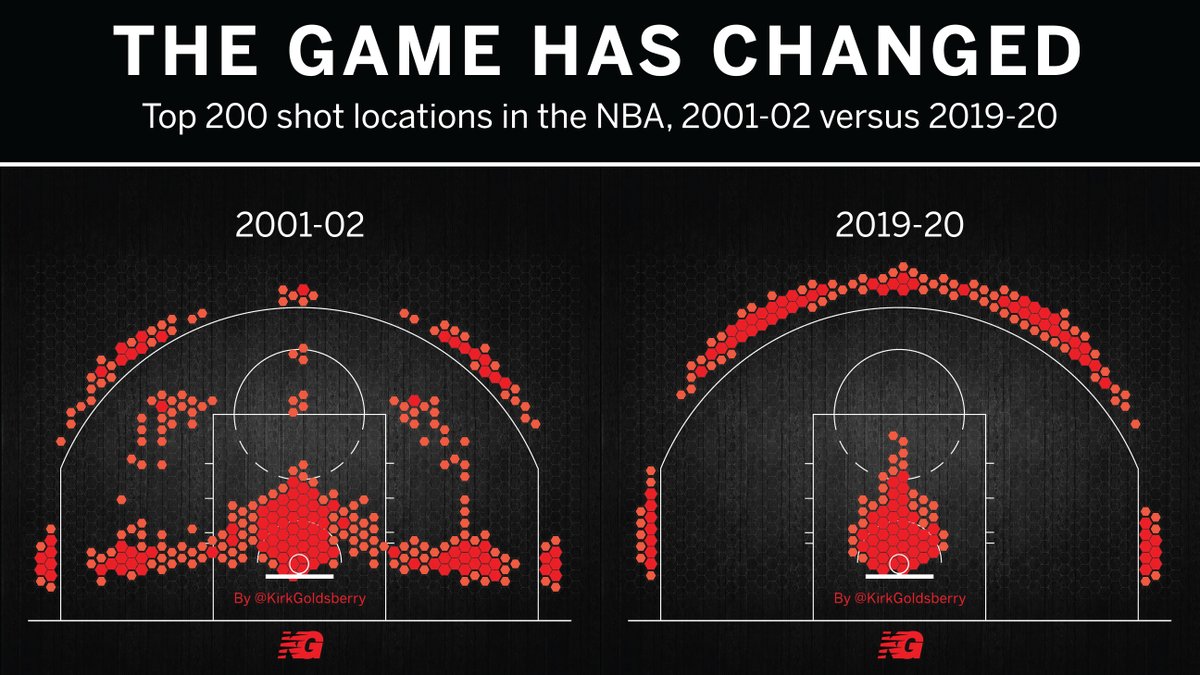To receive a free full-text email of The Zeitgeist whenever we publish to the website, please sign up here. You’ll get two or three of these emails every week, and your email will not be shared with anyone. Ever.
If there’s a single common thread in everything we write about politics here at Epsilon Theory, it’s that we believe our domestic political games have been transformed from coordination games, where positive-sum gameplay is at least possible, into pure competition games, where only zero-sum gameplay exists. We believe that has happened without any change in the “rules” of our domestic political games, but through the actions of political entrepreneurs who “defected” from the way the game was traditionally played. Once one political entrepreneur enjoyed success from this defection, ALL politicians were forced to follow suit, permanently changing the nature of the game.
The exact same thing happened in the NBA.

The NBA has had a 3-point line since 1979. This is not a new rule. It’s been tinkered with over the past 40 years, almost always to make the 3-point shot more difficult, but there is absolutely nothing new about this RULE. And yet, over the past 13 seasons (the elimination of midrange 2-point shots begins in earnest in the 2007-08 NBA season), the way that the NBA game is played has been totally transformed.
There are no more 2-point shots that aren’t lay-ups or put-backs from near the basket. For all practical purposes, they do not exist. There are lay-ups and there are free throws and there are 3-point shots. That’s it.
How did this happen? Were NBA coaches in the 28 year period from 1979 to 2007 just not as smart as NBA coaches today? Could they just not figure out that this was the way to win games? Were NBA players in the 28 year period from 1979 to 2007 just not as talented as NBA players today? Could they just not hit a 3-point shot?
Nope, Daryl Morey happened. I mean, there were others with similar ideas, but I’m going to give credit to (my friend) Daryl Morey, the just recently departed GM of the Houston Rockets. Daryl Morey is an entrepreneur in the truest sense of the word – he had a new idea and the guts to stake his career on that idea. When he was promoted to the GM role by Rockets owner Les Alexander in 2007, he didn’t change the rules of professional basketball, he changed the idea of how basketball should be played within those rules. He constructed a team and found coaches who would play basketball to maximize the impact of the 3-point shot, and the Rockets enjoyed quite a bit of success over the next 13 years. In fact, the Houston Rockets had the second best won-lost record in the entire NBA over Morey’s tenure as GM.
But the Rockets never won a championship. Why not? Because equilibrium. Because any idea that gives any sort of marginal advantage in the individual competitions that make up the overall game of professional basketball will be immediately copied by other GMs and coaches. Because as brilliant as Daryl Morey is and as talented as James Harden is, there are enough equally brilliant and equally talented people in the NBA to wash out the fleeting advantage of a good idea.
Once Daryl Morey’s new idea became the Common Knowledge of the NBA – once everyone knew that everyone knew that the way to win NBA games is to maximize 3-point shots and lay-ups – then it became a permanent feature of the way professional basketball is played. It became an equilibrium.
And you can’t undo an equilibrium.
So today, any player who attempts a midrange 2-point shot will be benched, any coach who institutes a strategy for anything other than 3-point offense and defense will lose, and any GM who constructs a team that doesn’t emphasize 3-point shooting will be fired.
“Yay, 3-point shooting and lay-ups! Yay, free throws!”
Some people think this new NBA game is a good game. Certainly it’s working out just fine for basketball entrepreneurs. I think it’s a much worse game that we will never recover from without fundamental changes in the rules of the game. I think it’s not working out well at all for us NBA fans.
It’s exactly the same with politics.
Some people think this new political game is a good game. Certainly it’s working out just fine for political entrepreneurs. I think it’s a much worse game that we will never recover from without fundamental changes in the rules of the game. I think it’s not working out well at all for us citizens.
#BITFD.




Kind of like the three true outcomes and the shift in baseball. Analytics distill everything to one approach and variation is punished. It is easier to change the rules in sport than in democracy and they can’t even do it in sports. Grrr
You know, there is one example that should have become equilibrial that never did for reasons I don’t quite understand.
Basically, Pete Carroll, the coach of the Seattle Seahawks, structured his team to play hyperaggressively in the defensive backfield, betting that flag fatigue would cause referees to begin withholding flags they would otherwise throw because they felt pressure not to excessively interrupt the flow of the game with penalty calls. It worked extremely well.
And then they stopped. To be sure, some of that has to do with having personnel who can actually make the most of press man coverage, which they began to lose with the departure of Sherman and Chancellor. But it just seemed to peter out across the league even though it clearly seemed to play a big role in their defensive success for several seasons.
/shrug
The end of the common threat posed by the Soviet Union is the “rule change” that brought about the collapse of community consensus and bipartisanship.
The threat posed by that alternative political system protected workers in the West from the ravages of the management class. When the Berlin Wall collapsed, professional managers (not visionaries, founders, or entrepreneurs) had free reign to shift income from labor to capital.
Trump is a transitional figure in the backlash against the overreach of this management class. The downsides of deregulation, globalization, and financialization induced a global response (populism is a worldwide phenomenon).
The difficulty going forward is that the world recognizes the danger posed by the environmental destruction that’s inherent in economic growth. You need not believe that climate change is anthropogenic to see the destruction of our woods, wildlife, and water caused by economic — by population — growth.
The question for us is: What system of ideas can replace those of neoliberalism, given that freedom — particularly economic freedom — leads to ruin? Décroissance?
ah, but is the 15 foot shot now the new arbitrage?? It’s rarely guarded and is twice as likely to go in as a 3-pointer, so the odds are actually better.
hmmm
Sooo, basketball aside, even though you all know I LOVE basketball, would you rather live in Colombia or in Japan if you had to choose?
This question came up on a call I was on yesterday in a conversation about GDP in the context of “is positive GDP always a good thing?” It’s something that everyone knows that everyone knows is good. If your economy is not growing, I mean, that’s bad right? Everyone knows that.
But I think from a peaceful society perspective (the focus of yesterday’s call) most people would probably rather live in Japan even though their GDP has been anemic and sometimes negative for decades and Colombia has consistently had very high GDP.
What do we choose to measure?
https://www.economicsandpeace.org/wp-content/uploads/2020/08/PPR-2019-web.pdf
Vin Scully, the preeminent baseball broadcaster (probably of all time) was asked what is the worst thing that happened to baseball in history? He answered, with little hesitation: “Velcro.” /smh #RaysUp
excellent illustration here Ben. Not to quibble, but “you can’t undo an equilibrium” is really “you can’t undo an equilibrium unilaterally,” correct? A rule change that forces a reassessment is an outside influence that could undo this equilibrium…
Would love to see this line of thought expounded upon
Basketball will change again once a new entrepreneur, probably a coach or player, identifies a competitive advantage for their team and others follow suit - the mid range shot will return in some form. The game will evolve always. Same in politics. Obama understood the power of the emergent social media and the promise of “Change” and Trump followed suit. This equilibrium can be disrupted more quickly, in basketball or politics, with a rule change which would have the potential to transition competitive advantage, possibly disruptively, from one team to another, or one style of play to another.
What was the competitive advantage which the political class and elites gained over the last 20 or 30 years which led to our MMT and the detriment of our middle class? Or what was the rule change (or series of changes) which led to this?
We need a movement and a leader who understand the evolution here and have a vision to drive a rule change to stem the tide and reverse course. Liberalism is far from dead, but without a vision and leadership it could die.
As a side note, I wish ET would stop using the acronym BITFD. This is not a solution and is counter to your “Let’s work together” thesis.
And to advance your conversation on a grass roots movement to save this country, maybe the world, I think at the core, we need heavy regulation of the social media industry which includes limitations on the use of AI and the break up of Facebook and Google within the US. They control too much messaging and drive too much of what people think and feel. And our politicians and elites use them as tools against the best interest of the middle class.
If I were the league and I saw that situation developing, I’d instruct the refs to aggressively make all the right calls when games were coming down to the wire, which would cause the Seahawks to lose close ones under this strategy and cause everyone to re-evaluate the tactic. It seems like the sort of thing that would only work when the refs didn’t understand it, and didn’t communicate between themselves.